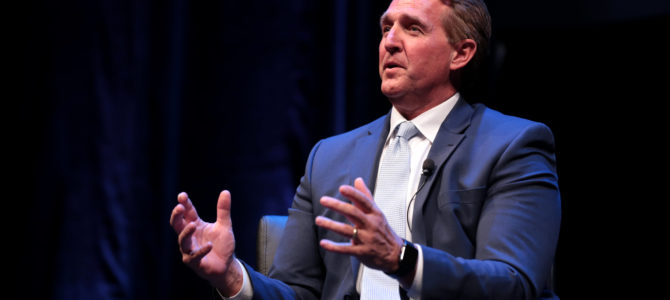
Jeff Flake has learned nothing and forgotten nothing. The former senator from Arizona is urging his former colleagues to abandon the president over the Ukraine allegations. Like the French aristocrats of the Bourbon restoration, Flake has learned nothing from losing the office he recalls so fondly. He denounces President Trump but does not consider why many voters preferred Trump, despite his manifest flaws, over Flake and his kind.
He thereby avoids a necessarily awkward self-analysis. If Flake’s view of the president is correct, then the political success of such a man indicates we are in a time of cultural decadence and political failure. But if so, his indictment of Trump is also an indictment of our political and cultural elite — including Flake. The former senator likes to tout his principles, but these appeals often seem to be an excuse to avoid self-examination.
The only failures Flake admits to are of being insufficiently horrified by and opposed to the president. He writes, “From the ordeal of this presidency, perhaps the most horrible — and lasting — effect on our democracy will be that at some point we simply stopped being shocked. And in that, we have failed not just as stewards of the institutions to which we have been entrusted but also as citizens.”
He concludes that the only hope for redemption is to reject Trump and all of his empty promises: “My fellow Republicans, it is time to risk your careers in favor of your principles. … You can go elsewhere for a job. But you cannot go elsewhere for a soul.” It is up to Flake to look after his own soul, but it is not self-evident that the spiritually superior choice is electing a Democrat who promises an abortionist in every hospital and a man in every girls’ locker room.
Flake and Douthat Simply Don’t Get It
Ross Douthat, the lone conservative at The New York Times (neoliberals don’t count), made a more plausible case for ditching President Trump. Douthat argued the Republican Party might be better off if it dumped Trump now, providing the Democratic defense of Bill Clinton as a cautionary tale.
Perhaps the Democrats would have been better off had they ejected their priapic president from office, and perhaps Republicans would benefit if they abandoned the personally unpopular Trump. However, Clinton did survive with the support of the Democratic Party, and this precedent ensures Republican voters are unlikely to turn on their guy over an ambiguous phone call that was arguably entirely above-board.
The wrongdoing of Douthat’s employer provides further reasons for Republicans to stick with Trump. A fortnight before Douthat’s case for defenestrating Trump, his own paper, indeed, his own section in the paper, published a piece dishonestly smearing Supreme Court Justice Brett Kavanaugh. At best, Douthat’s colleagues are incompetent. More likely, they are liars. But they got away without real consequences and succeeded in pushing Democrats, including Sen. Elizabeth Warren, to endorse impeaching Kavanaugh.
This behavior confirms the conservative suspicion that the left will cry “wolf” about anyone who threatens their agenda, which in turn suggests it might be better to send a wolf, rather than another lamb to the slaughter. When Republicans praise Trump for being a fighter, it is because he is willing to aggressively challenge the left’s dishonest tactics in a way the Jeff Flakes of the GOP do not.
This misconduct by The New York Times also illustrates the asymmetry of the current political and cultural conflict. The left has disproportionate cultural and economic power in areas including the national media, Big Tech, academia, and the entertainment industry, and it aggressively deploys this power to punish and exclude conservatives.
Thus, many on the right view Trump (and the judges he appoints) as essential bulwarks against the combination of leftist cultural and political ascendancy. The more the left uses cultural and economic power to punish dissent, the more dissenters will be inclined to stick with a politician who will protect them, regardless of his flaws.
Elites and Leftists Drive Voters to Embrace Trump
Thus, although Douthat’s appeal to GOP self-interest is more sophisticated than Flake’s argument for making Trump walk the political plank, it founders for similar reasons: elite corruption and left-wing radicalism. Unlike the oblivious former senator, however, Douthat is at least aware of these problems. Flake and Douthat respectively look at Senate Democrats and the staff of The New York Times and see colleagues. Trump supporters see would-be oppressors.
The sins of American elites and the left do not excuse Trump’s bad behavior, but they are why his supporters are willing to put up with it. When Trump supporters look at newsrooms, universities, and other bastions of the left, they do not see an obvious moral superiority to the president. When they look at the rest of government, they do not see competent, principled public servants.
Rather, they look at the malice and misconduct of the left and fear what it will do when it gains the full power of the federal government. The last Democratic administration was obsessed with forcing nuns to fund and facilitate the distribution of birth control, and it argued in the Supreme Court that the government has the power to regulate the hiring and firing of religious ministers. Those auditioning to be the next Democratic president are promising worse.
A political and cultural elite that was responsive to the issues raised by Trump’s populist success would have credibility when it urged people to turn against Trump. A left that was tolerant of dissenters and nonconformists would frighten fewer people into supporting Trump. But elites have responded to the populist mood with outraged entitlement, and the left has reacted to Trump by radicalizing rather than moderating in an effort to win allies.
They seem to believe accountability and moderation are for other people, not for them. Thus, they view Trump only as a monstrous injustice and do not consider that he may be a well-deserved judgment upon them.









